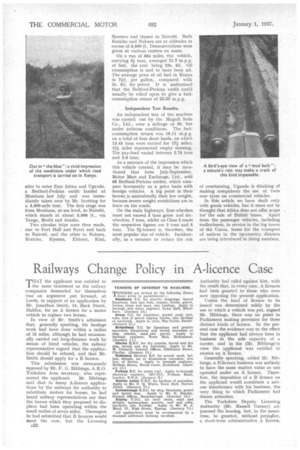Railways Change Policy in A-licence Case
Page 102

If you've noticed an error in this article please click here to report it so we can fix it.
THAT the applicant was entitled to the same treatment as the railway companies demanded for themselves was an argument put forward, at Leeds, in support of an application by Mr. Jonathan Smith, 14, Back Street, Halifax, for an A licence for a motor vehicle to replace two horses.
In view of Mr. Smith's admission that, generally speaking, his haulage work had been done within a radius of 15 miles, although he had occasionally carried out long-distance work by means of hired vehicles, the railway representative argued that the aPplication should be refused, and that Mr. Smith should apply for a B licence.
This submission was strenuously opposed by Mr. F. G. Bibbings, A.R.O. Yorkshire Area secretary, who repre
sented the applicant. Mr. Bibbings said that in many A-licence applications by the railways for authority to substitute motors for horses, he had heard railway representatives say that the horses which they proposed to displace had been operating within the small radius of seven miles. Thereupon he had submitted that B licences would meet the case, but the Licensing
c52 Authority had ruled against him, with the result that, in every case, A licences had been granted to those who were now opposing the present application.
Unless the kind of licence to be issued was determined solely by the use to which a vehicle was put, argued Mr. Bibbings, there was no point in Parliament making provision for three distinct kinds of licence. In the present case the evidence was to the effect that the applicant had always been in business in the sole capacity of a carrier, and in his (Mr. Bibbirigs's) view the applicant was entitled to receive an A licence.
Generally speaking, added Mr. Bibbings, a B-licence business was unlikely to have the same market value as one operated under an A licence. Therefore, the imposition of a B licence on the applicant would constitute a serious interference with his business, the very thing to which Parliament had drawn attention,
The Yorkshire Deputy Licensing Authority (Mr. Russell Gurney) adjourned the hearing. but, in the meantime, he granted, without prejudice, a short-term administrative A licence.




























































































































































